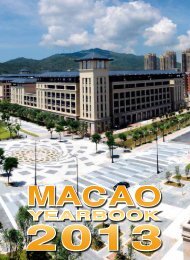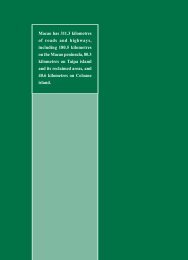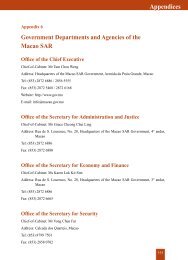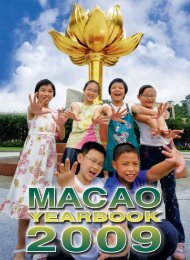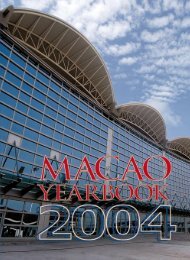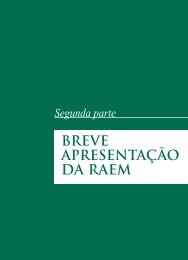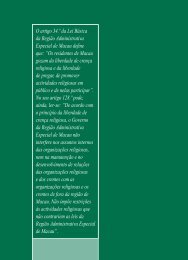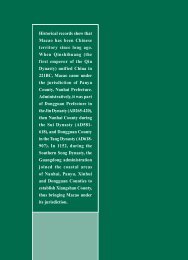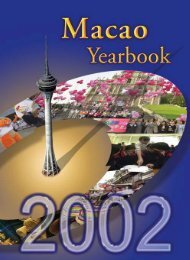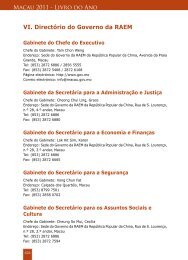- Page 1 and 2: part 2 Overview of the MACAO SAR
- Page 3 and 4: CHAPTER 1 POLITICAL SYSTEM AND ADMI
- Page 5 and 6: Part 2 Chapter 1 Political System a
- Page 7 and 8: Political System and Administration
- Page 9 and 10: Political System and Administration
- Page 11 and 12: Political System and Administration
- Page 13 and 14: Political System and Administration
- Page 15 and 16: Political System and Administration
- Page 17 and 18: Political System and Administration
- Page 19 and 20: Political System and Administration
- Page 21 and 22: Political System and Administration
- Page 23 and 24: Political System and Administration
- Page 25 and 26: Political System and Administration
- Page 27 and 28: Political System and Administration
- Page 29 and 30: Political System and Administration
- Page 31 and 32: Political System and Administration
- Page 33 and 34: Chief Executive Chui Sai On attends
- Page 35 and 36: The Secretary for Administration an
- Page 37 and 38: CHAPTER 2 the legal system and the
- Page 39 and 40: Part 2 Chapter 2 The Legal System a
- Page 41: The Legal System and the Judiciary
- Page 45 and 46: The Legal System and the Judiciary
- Page 47 and 48: The Legal System and the Judiciary
- Page 49 and 50: The Legal System and the Judiciary
- Page 51 and 52: The Legal System and the Judiciary
- Page 53 and 54: The Legal System and the Judiciary
- Page 55 and 56: The Legal System and the Judiciary
- Page 57 and 58: The Legal System and the Judiciary
- Page 59 and 60: The Legal System and the Judiciary
- Page 61 and 62: The Legal System and the Judiciary
- Page 63 and 64: Chief Executive Chui Sai On attends
- Page 65 and 66: The Government Information Bureau (
- Page 67 and 68: CHAPTER 3 EXTERNAL RELATIONS
- Page 69 and 70: Part 2 Chapter 3 External Relations
- Page 71 and 72: External Relations organisations. T
- Page 73 and 74: External Relations Convention on th
- Page 75 and 76: External Relations translation and
- Page 77 and 78: External Relations of these, gross
- Page 79 and 80: External Relations Chief Executive
- Page 81 and 82: The Secretary for Administration an
- Page 83 and 84: The closing ceremony of the 4th Ann
- Page 85 and 86: CHAPTER 4 ECONOMY
- Page 87 and 88: Part 2 Chapter 4 Economy Economy Al
- Page 89 and 90: Economy Export Diversification Ince
- Page 91 and 92: Economy individual basis, approve t
- Page 93 and 94:
Economy The Insurance Industry Mark
- Page 95 and 96:
Economy of 56.6 percent compared to
- Page 97 and 98:
Economy Finance and Taxation Budget
- Page 99 and 100:
Economy of the characteristics of v
- Page 101 and 102:
Economy are 35 percent and 20 perce
- Page 103 and 104:
Economy services: mainland China ha
- Page 105 and 106:
Economy Economic Co-operation and S
- Page 107 and 108:
Economy Certificates of Origin Cert
- Page 109 and 110:
Economy • Inflammable explosives;
- Page 111 and 112:
Economy In addition, the Economic S
- Page 113 and 114:
Economy • To provide back-up serv
- Page 115 and 116:
Economy One-Stop Service for Invest
- Page 117 and 118:
Economy skills; 3. Training Series
- Page 119 and 120:
Economy management levels to intern
- Page 121 and 122:
Economy Industrial Park Co. into th
- Page 123 and 124:
Economy Vocational Training The Voc
- Page 125 and 126:
Economy as enterprises employing 30
- Page 127 and 128:
Economy The Labour Inspection Depar
- Page 129 and 130:
Economy the department organised fo
- Page 131 and 132:
Economy Chinese and western pharmac
- Page 133 and 134:
Economy information system. Product
- Page 135 and 136:
Economy permanent secretariat shoul
- Page 137 and 138:
Economy collaboration with other re
- Page 139 and 140:
Economy In accordance with legal re
- Page 141 and 142:
Economy Chief Executive Chui Sai On
- Page 143 and 144:
2010 MIECF: The Secretary for Econo
- Page 145 and 146:
CHAPTER 5 THE GAMING INDUSTRY
- Page 147 and 148:
Part 2 Chapter 5 The Gaming Industr
- Page 149 and 150:
The Gaming Industry system. Under t
- Page 151 and 152:
The Gaming Industry than in the pre
- Page 153 and 154:
The Gaming Industry comply with rel
- Page 155 and 156:
The Gaming Industry monitored probl
- Page 157 and 158:
Chief Executive Chui Sai On attends
- Page 159 and 160:
CHAPTER 6 TOURISM
- Page 161 and 162:
Part 2 Chapter 6 Tourism Tourism To
- Page 163 and 164:
Tourism works towards the objective
- Page 165 and 166:
Tourism Information Counters The Pu
- Page 167 and 168:
Tourism teamed up with a number of
- Page 169 and 170:
Tourism the present one was built.
- Page 171 and 172:
Tourism Barra Fortress Barra Fortre
- Page 173 and 174:
Tourism tower in the world and the
- Page 175 and 176:
Tourism Chief Executive Chui Sai On
- Page 177 and 178:
The opening ceremony of the 10th Ma
- Page 179 and 180:
The opening ceremony of the 22nd Ma
- Page 181 and 182:
The 22nd Macao International Firewo
- Page 183 and 184:
CHAPTER 7 Public Order
- Page 185 and 186:
Part 2 Chapter 7 Public Order Publi
- Page 187 and 188:
Public Order Rank Members Commissio
- Page 189 and 190:
Public Order Organised Crime Divisi
- Page 191 and 192:
Public Order Police-Community Relat
- Page 193 and 194:
Public Order After passing the trai
- Page 195 and 196:
Public Order Fire Prevention Articl
- Page 197 and 198:
Public Order International Cooperat
- Page 199 and 200:
Public Order with standard medical
- Page 201 and 202:
Public Order six visitors at one ti
- Page 203 and 204:
Public Order Inmates The reformator
- Page 205 and 206:
Public Order The Secretary for Secu
- Page 207 and 208:
The Government launches a typhoon d
- Page 209 and 210:
CHAPTER 8 EDUCATION
- Page 211 and 212:
Part 2 Chapter 8 Education Educatio
- Page 213 and 214:
Education year, the scheme provided
- Page 215 and 216:
Education requirements in every per
- Page 217 and 218:
Education teaching skills and condu
- Page 219 and 220:
Education In the 2010/2011 school y
- Page 221 and 222:
Education Consultation on the Holis
- Page 223 and 224:
Education exchanges, develop scient
- Page 225 and 226:
Education talks on tertiary educati
- Page 227 and 228:
Education staff: six chair professo
- Page 229 and 230:
Education Undergraduate Studies, th
- Page 231 and 232:
Education Chief Executive Chui Sai
- Page 233 and 234:
Chief Executive Chui Sai On attends
- Page 235 and 236:
The 20th Annual Conference of the A
- Page 237 and 238:
CHAPTER 9 CULTURE AND SPORT
- Page 239 and 240:
Part 2 Chapter 9 Culture and Sport
- Page 241 and 242:
Culture and Sport Verdi, and the Ba
- Page 243 and 244:
Culture and Sport bring artists clo
- Page 245 and 246:
Culture and Sport Macao Central Lib
- Page 247 and 248:
Culture and Sport Coloane Library B
- Page 249 and 250:
Culture and Sport residence of one
- Page 251 and 252:
Culture and Sport coupons, as well
- Page 253 and 254:
Culture and Sport significance, and
- Page 255 and 256:
Culture and Sport The museum also p
- Page 257 and 258:
Culture and Sport room with an info
- Page 259 and 260:
Culture and Sport medal, by scoring
- Page 261 and 262:
Culture and Sport (Cont.) Venue Are
- Page 263 and 264:
Culture and Sport The Civic and Mun
- Page 265 and 266:
Culture and Sport Basic Information
- Page 267 and 268:
Culture and Sport feed the pigeons
- Page 269 and 270:
Culture and Sport Chief Executive C
- Page 271 and 272:
Chief Executive Chui Sai On watches
- Page 273 and 274:
New Year’s Eve Countdown to 2010.
- Page 275 and 276:
The 21st Macao Arts Festival: the K
- Page 277 and 278:
The Cultural Affairs Bureau lays th
- Page 279 and 280:
CHAPTER 10 Health and Social Welfar
- Page 281 and 282:
Part 2 Chapter 10 Health and Social
- Page 283 and 284:
Health and Social Welfare residents
- Page 285 and 286:
Health and Social Welfare Polytechn
- Page 287 and 288:
Health and Social Welfare Kiang Wu
- Page 289 and 290:
Health and Social Welfare Environme
- Page 291 and 292:
Health and Social Welfare be tested
- Page 293 and 294:
Health and Social Welfare The Socia
- Page 295 and 296:
Health and Social Welfare Macao has
- Page 297 and 298:
Health and Social Welfare games, we
- Page 299 and 300:
Chief Executive Chui Sai On inspect
- Page 301 and 302:
Chief Executive Chui Sai On visits
- Page 303 and 304:
The Social Security Fund holds a br
- Page 305 and 306:
CHAPTER 11 Media, Communications an
- Page 307 and 308:
Part 2 Chapter 11 Media, Communicat
- Page 309 and 310:
Media, Communications and Informati
- Page 311 and 312:
Media, Communications and Informati
- Page 313 and 314:
Media, Communications and Informati
- Page 315 and 316:
Media, Communications and Informati
- Page 317 and 318:
Media, Communications and Informati
- Page 319 and 320:
Media, Communications and Informati
- Page 321 and 322:
Media, Communications and Informati
- Page 323 and 324:
Chief Executive Chui Sai On attends
- Page 325 and 326:
The Director of Government Informat
- Page 327 and 328:
CHAPTER 12 Land, Infrastructure, Ho
- Page 329 and 330:
Part 2 Chapter 12 Land, Infrastruct
- Page 331 and 332:
Land, Infrastructure, Housing and P
- Page 333 and 334:
Land, Infrastructure, Housing and P
- Page 335 and 336:
Land, Infrastructure, Housing and P
- Page 337 and 338:
Land, Infrastructure, Housing and P
- Page 339 and 340:
Land, Infrastructure, Housing and P
- Page 341 and 342:
Land, Infrastructure, Housing and P
- Page 343 and 344:
Land, Infrastructure, Housing and P
- Page 345 and 346:
Land, Infrastructure, Housing and P
- Page 347 and 348:
Chief Executive Chui Sai On attends
- Page 349 and 350:
The Secretary for Transport and Pub
- Page 351 and 352:
The Lands, Public Works and Transpo
- Page 353 and 354:
CHAPTER 13 Transport
- Page 355 and 356:
Part 2 Chapter 13 Transport Transpo
- Page 357 and 358:
Transport an ongoing basis, and ens
- Page 359 and 360:
Transport As at 31 December 2010, t
- Page 361 and 362:
Transport 17.96 percent over the 20
- Page 363 and 364:
Transport Port Management and Servi
- Page 365 and 366:
Transport Maritime Training School
- Page 367 and 368:
Transport (Cont.) Signatories of Ai
- Page 369 and 370:
Transport Bridge and the Lotus Flow
- Page 371 and 372:
Transport The Secretary for Transpo
- Page 373 and 374:
Conducting a Transport Bureau surve
- Page 375 and 376:
CHAPTER 14 Geography, Environment a
- Page 377 and 378:
Part 2 Chapter 14 Geography, Enviro
- Page 379 and 380:
Geography, Environment and Populati
- Page 381 and 382:
Geography, Environment and Populati
- Page 383 and 384:
Geography, Environment and Populati
- Page 385 and 386:
Geography, Environment and Populati
- Page 387 and 388:
Geography, Environment and Populati
- Page 389 and 390:
Geography, Environment and Populati
- Page 391 and 392:
Geography, Environment and Populati
- Page 393 and 394:
Geography, Environment and Populati
- Page 395 and 396:
Geography, Environment and Populati
- Page 397 and 398:
Geography, Environment and Populati
- Page 399 and 400:
Geography, Environment and Populati
- Page 401 and 402:
Geography, Environment and Populati
- Page 403 and 404:
Chief Executive Chui Sai On attends
- Page 405 and 406:
The launch ceremony of Small and Me
- Page 407 and 408:
During the 2010 Macao International
- Page 409 and 410:
CHAPTER 15 Religion and Customs
- Page 411 and 412:
Part 2 Chapter 15 Religion and Cust
- Page 413 and 414:
Religion and Customs The clerics re
- Page 415 and 416:
Religion and Customs By the late 19
- Page 417 and 418:
The Secretary for Transport and Pub
- Page 419 and 420:
CHAPTER 16 History
- Page 421 and 422:
Part 2 Chapter 16 History History M
- Page 423:
History of the Republic, ratified t



